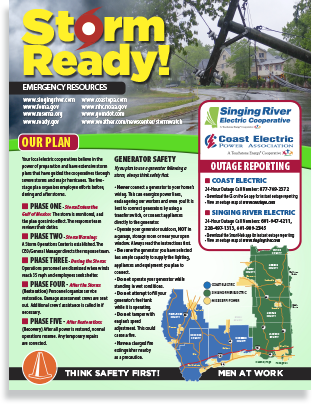Storm Center

Text OUT to
601-947-1744
or use the SmartHub app.
Reporting an outage by text or app is the fastest and most accurate way to report a power outage. Both enter outage information directly into the outage management system, shortening restoration time.
View OUTAGE MAP
24/7, from anywhere.
Report an outage by calling any SRE office.
When a member's contact information is saved in SRE's system, it recognizes the number and pulls up the account information, shortening the restoration time. Remember to use the phone with the saved number when reporting the outage.
Be Prepared for When Storms Strike
Keep the safety of your family and Singing River Electric’s linemen in mind after a storm.
Call 911 or Singing River Electric to report downed power lines that present a clear and imminent danger. Treat all downed lines as if they are energized, and stay away from them. Beware of lines hidden by debris or in trees. Be cautious at night when you may not see a downed line.
Turn around and don’t drown. Avoid flooded areas, and do not drive through unknown pools of water. Be especially cautious driving at night.
If water damages your home, turn off circuit breakers and do not use electrical outlets. Damage to your home’s electrical system must be repaired by a licensed electrician before Singing River Electric linemen can restore power.
Do not connect a generator directly to your home’s wiring; this can energize power lines and put our linemen at risk. Also, do not operate a generator while standing in wet conditions or use in an enclosed area. For more generator safety tips, click here.
How is my power restored?
Mother Nature knocks it out and we bring the power back on. There are steps we follow when making restorations.
How do I Reset My Breakers?
Mother Nature knocks it out and we bring the power back on. There are steps we follow when making restorations.

Download our storm ready insert today!
From contact information to generator safety to tips to deal with any weather situation, this is a vital resource to have!

